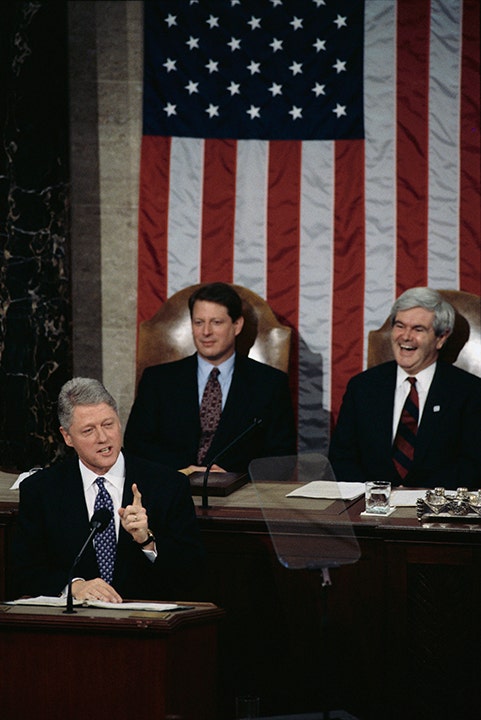In 1994, Newt Gingrich spearheaded the Republican resurgence in the House of Representatives, culminating in their first majority in four decades. Reflecting on this achievement, Gingrich recently advised the contemporary House Freedom Caucus to emulate the strategic approach of his Conservative Opportunity Society, a group he co-founded in 1983. Gingrich underscored the “positive action principles” they developed, which laid the groundwork for the “Contract with America” and the subsequent Republican takeover of the House. He echoed political commentator Mark Halperin’s observation that the Freedom Caucus, while passionate about various causes, lacks a cohesive strategy to realize its objectives.
Gingrich’s rise to prominence began in the 1980s, a period dominated by Democratic Speaker Tip O’Neill, despite Ronald Reagan’s presidency. Leveraging the advent of C-SPAN, Gingrich utilized late-night floor speeches to address conservative issues, albeit to a sparsely populated chamber. However, this tactic effectively reached a wider audience through the nascent television platform, solidifying his position as a conservative voice. Craig Shirley, Gingrich’s biographer, emphasized the astute political maneuvering of Gingrich, who built upon Reagan’s legacy to advocate for conservative governance. Shirley pointed out that the core tenets of conservatism, including limited government, reduced taxes, robust national defense, and pro-life stance, remain consistent despite perceived shifts in the GOP.
Former Representative Vin Weber, a key member of Gingrich’s conservative cohort, shed light on the rarity of groups like the Conservative Opportunity Society and the later Freedom Caucus. Weber highlighted the inherent tension between expressing dissenting views and maintaining party unity. He recounted how Gingrich, recognizing the limitations of individual action, recruited him to organize and amplify the conservative voice within the Republican conference. This collaborative effort marked the beginning of a concerted conservative push within the party.
The Freedom Caucus, according to Shirley, currently holds a significant advantage with Republican control in Washington. He argued that while they lack a formal “contract” like Gingrich’s group, they possess a defined set of ideological principles and policy objectives. Shirley expressed confidence in Speaker Mike Johnson’s commitment to Reaganite ideals, suggesting the caucus has a strong ally in leadership. Gingrich himself praised Johnson’s character and leadership style, acknowledging his own contrasting temperament. However, some members of the Freedom Caucus, such as Representative Ralph Norman, expressed reservations about Johnson’s commitment to the Trump agenda and fiscal conservatism, demanding more concrete assurances of his willingness to fight for their priorities, including a balanced budget and spending offsets.
Norman’s initial reluctance to vote for Johnson, along with Representative Keith Self, signaled the Freedom Caucus’s intent to exert its influence. This strategic maneuver was aimed at conveying their demands directly to Johnson and securing his commitment to their agenda. Norman explained that his eventual support for Johnson was contingent on the Speaker’s promise to champion their priorities, reinforced by Trump’s endorsement of Johnson as the sole viable candidate within the caucus. This episode underscores the internal dynamics of the Republican Party and the Freedom Caucus’s leverage within it.
The House Freedom Caucus, under Chairman Andy Harris, outlined their expectations for Speaker Johnson in a “Dear Colleague” letter. While affirming their support for Johnson, they voiced concerns about his past record and emphasized the need for him to champion conservative goals, including reversing the perceived damage of the Biden-Harris administration. The caucus’s demands included a busier House schedule, fiscal responsibility through reconciliation legislation, adherence to the 72-hour rule for debating amendments, and refraining from relying on Democratic votes to pass legislation lacking majority support within the Republican caucus. This letter served as a formal declaration of the Freedom Caucus’s policy priorities and their expectation of Johnson’s adherence to them.
Representative Norman’s concluding remarks underscored the Freedom Caucus’s intention to hold Johnson accountable for his promises. He believed that the initial hesitance displayed by several Republicans during the speaker vote, coupled with his and Self’s initial abstention, effectively communicated the caucus’s seriousness and their expectation of Johnson’s commitment to their agenda. This strategic display of power demonstrated the Freedom Caucus’s determination to influence the House’s legislative direction and ensure their priorities are addressed. Their actions reflect a broader struggle within the Republican Party, between those seeking to maintain party unity and those pushing for a more assertive conservative agenda.

